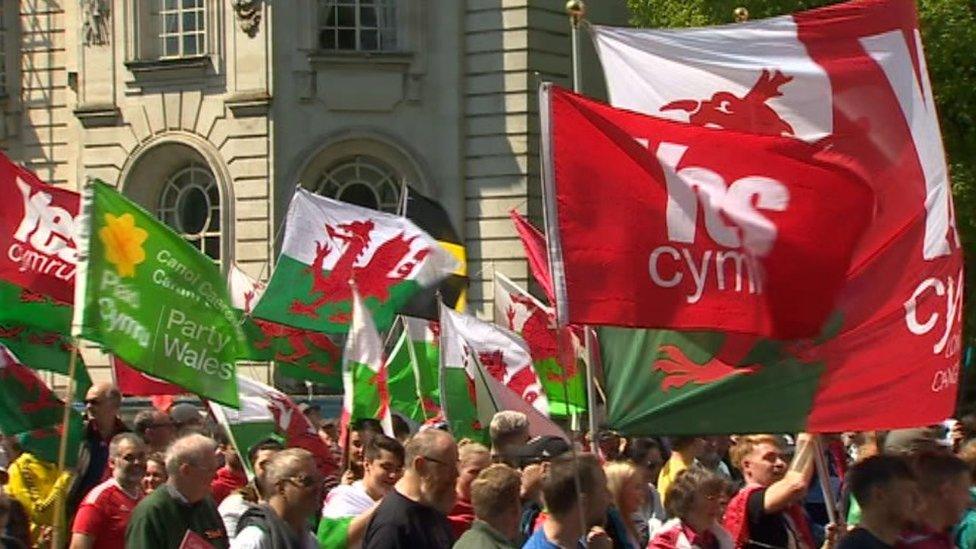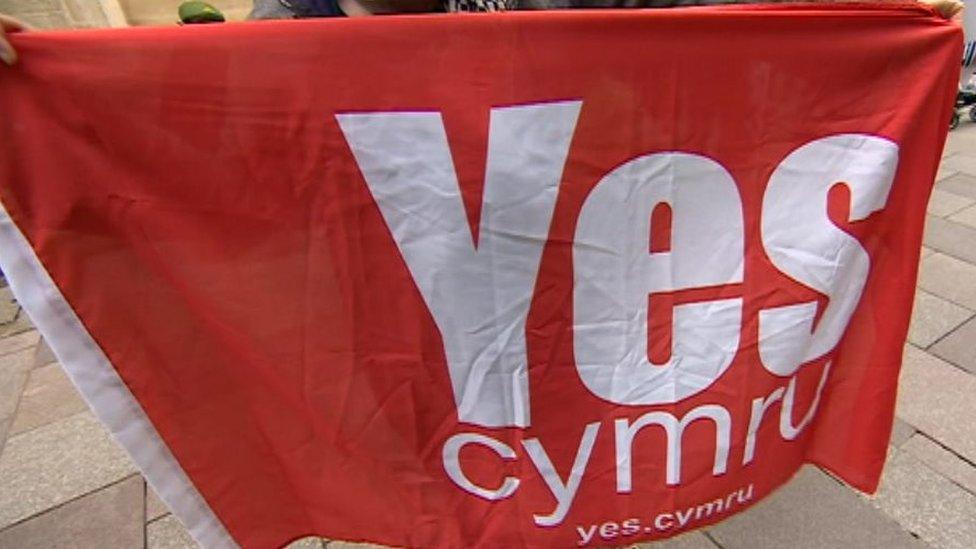Independent Wales: Carwyn Jones says curiosity driven by UK politics
- Published
- comments
"We would undoubtedly lose money"
The "shambles" in Westminster is driving curiosity in Welsh independence, former first minister Carwyn Jones has said.
Mr Jones will take part in a debate organised by a pro-independence group at the National Eisteddfod, in August.
He will make the case against Wales going its own way, but said he felt there had been "some change" in the mood in the country on the topic.
An independence march in Cardiff attracted large crowds in May.
Siôn Jobbins, of YesCymru - the group organising the event at the Eisteddfod in Llanrwst - welcomed Mr Jones' participation but said Westminster had left Wales poorer.
Mr Jones, who stood down as first minister at the end of last year, said "people who I wouldn't have thought" had told him it was an idea "worth looking at".
"It's all to do with the shambles in Westminster really, that's what's driving it. People are feeling that they've lost faith in what's been happening [there]," he said.
Asked if there had been a change in the mood, he said: "There's been some change. I think people are curious rather than favourable, because there are lots of issues that would need to be overcome."
But he said it was important "that there is honesty" in terms of what independence means.
The AM for Bridgend said he was not going to the YesCymru debate "to advocate the case for independence, but to explain the practical obstacles that stand in the way".

An independence march in Cardiff attracted large crowds in May
Asked what the impediments were for him, and whether it was an emotional attachment to Britain, he replied: "No, it's mainly practical.
"I'm a proud Welshman, and I think that Wales is best served by being within the union of the UK - not the current union, I think a lot of work needs to be done to make it more equal than it is now.
"I don't see what advantages independence would give us if I'm honest. We'd have less money and we couldn't make that up in the short term. Ireland took many many years to do that.
"And some people say 'well it's an opportunity for us to do a separate deal with Europe, and have access to the single market'. Of course, our biggest market, in terms of a country, is England.
"There's very little point in having, shall we say, market access to the single market and finding we can't export to England."
He added: "I think it's important to have these debates but it's important that the debate takes place between people who have different views."

'A significant shift in his position'
By Vaughan Roderick, BBC Welsh affairs editor

YesCymru is campaigning for Welsh independence
There was a time where almost every set-piece speech by Carwyn Jones seemed to include the claim that he was "proud to be Welsh and proud to be British" so his admission that his opposition to Welsh independence is practical rather than emotional marks a significant shift in his position.
The former first minister hasn't become an overnight convert to nationalism though. His intervention is clearly driven by a growing interest in the idea of independence amongst Labour activists.
The decision earlier this year to allow a pro-independence group to stage a fringe meeting at the Welsh Labour conference would have been unthinkable until recently and Mr Jones clearly feels a need to spell out the difficulties any move towards an independent Wales would face.
Mr Jones's word can also be seen as a warning to the UK Government that unless the devolution settlement is modernised calls for independence will only grow.


Mr Jobbins said YesCymru was "very glad" the former first minister was taking part.
He claimed that, whatever people's opinions, it was "a question that's going to land on our lap in the next few years", speculating that there may be a successful independence vote in Scotland and a vote to unite Northern Ireland with the Republic of Ireland.
"We'd be left in the situation where we'd have a rump UK which is basically England and Wales, and under that situation I can't see how devolution can survive.
"At the moment Wales is one of the poorest regions, in the economic sense in Europe, and that's with Westminster rule.
"We're in the situation we are today because we are governed through Westminster. I can't see how anyone can make the case, that we would be worse off than if we were independent.
"As a Welsh nationalist I'm not looking to put up border posts. I would foresee free-movement of goods and people".
Mr Jobbins said YesCymru was a "non-party political movement" with a "sole aim to make the case for an independent Wales".
"We are under no illusion about the mountain we have to climb," he said. "We are against centuries of lack of self-belief, and also economic policies and an ideology that have mitigated against creating a stronger economy and society".
But former Welsh Conservative leader Andrew RT Davies pointed to low figures for support for independence in opinion polls.
"Perhaps the only people getting more curious about such a prospect are former first ministers residing in the Bay bubble", he tweeted, external.